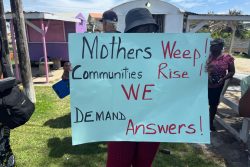Dear Editor,
A letter writer recently claimed that “It was the bounden and civic duty of persons knowledgeable of rape in the Guyana National Service to report these incidents to the police”. Is this writer even aware that over 80% of rapes are never reported today? As American psychotherapist, Beverly Engel puts it, “victims are often too ashamed to come forward. Sexual assault is a very humiliating and dehumanizing act against someone.” As well then, even more than now, parents and family elders preferred to sweep rape and sexual assault under the carpet because of misplaced family honour. Then, more than now too, victim blaming was pervasive.
Besides, the political dynamics of those times would have made it impossible for rape victims to report the rapes. In fact one would recall during those days a prominent PNC personality who allegedly raped a young lady from a very prominent family was exonerated by an ‘investigation’. Today only a fraction – 25% – of reported rapes lead to prosecution. In those days this fraction would have been even less. As well, everyone is aware that in Guyana, police responses to rape have been anything but serious. Imagine how much more cavalier that attitude would have been so many decades ago.
The writer then claims, “It is still not too late to do so (i.e. report those National Service rapes)”. How many of those victims would still be around or still living in Guyana? How many of the perpetrators would still be around or still living in Guyana? As well would medical evidence and other facets of those cases be available today? Would those victims want to revisit the horror of their rapes, decades later?
The writer also states, “Most of the administrators of the Guyana National Service were recipients of national awards….It goes against the grain for anyone to think that administrators of such honourable repute will sit idly by and condone high incidences of rape under their watch.” Really? Is the writer aware that rapes in the military/paramilitary globally, have a higher rate than among the general population but very, very few victims ever report and those who report are usually vilified and further victimized? Yet, military/paramilitary institutions are usually headed by honourable administrators.
The writer then makes an excursion into his own experiences, to claim that “national service is about discipline, a trait which is sadly lacking in our society. With discipline comes exemplary work ethics, punctuality, leadership, respect for each other, educational pursuits, and many other desirable aspects of nation building.” The issue of whether these traits actually saturate those who went through national service, is debatable at best, but, in any case aren’t these traits supposedly inculcated by militaries also? I served for eight years in the US military so I’m absolutely aware of what is inculcated, what obtains and what is covered up. The simple fact is that discipline inculcated in military/para military institutions, is a state of order and obedience within, characterized by prompt and willing responsiveness to orders and unquestionable acceptance of compliance to regulation. It is not the kind of discipline that necessarily fosters ethical, humane and emphatic behaviour, especially when the institution, like National Service, was built for purposes other than what traditional militaries are tasked with.
Sincerely,
Annan Boodram









